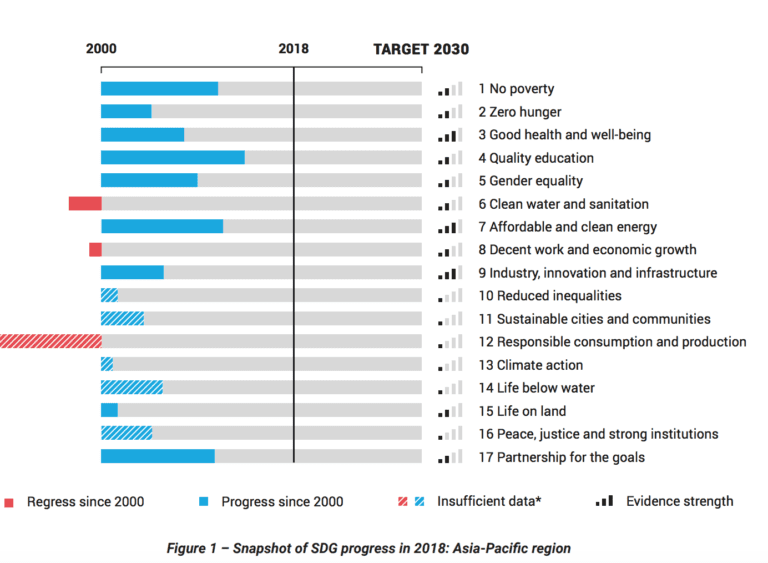Asia: Countries Off-Track to Reach SDGs
A recent UN report warns, not a single country in the Asia and Pacific region is on track to achieve the Sustainable Development Goals (SDGs) by 2030.
Although progress has been made on some fronts – namely toward ending poverty (SDG1), ensuring all have access to quality education and lifelong learning (SDG 4) and delivering affordable and clean energy (SDG7) – the report says it’s still not fast enough to achieve the targets by 2030. For more than half of the goals, progress has stagnated.
For goal 3.5 that address alcohol as obstacle to development, progress has halted and is in danger of being reversed, according to latest scientific findings and recent WHO reporting to the World Health Assembly in May 2019.
Along those lines, the report reveals that the situation is actually deteriorating for three of the goals:
- clean water and sanitation (SDG 6),
- decent work and economic growth (SDG 8),
- sustainable consumption and production (SDG 12).
Alcohol is known to adversely affect 13 of the 17 SDGs. The 3 goals which are deteriorating in the Asia Pacific region (SDG 6, 8 and 12) are all negatively affected by alcohol. Evidently, alcohol is an obstacle to development and is setting back the Asia Pacific region.
Can the region achieve the SDGs?
According to the report, strengthening on two key areas of focus can make a massive difference: environmental protections and the means of implementing the Goals (SDG 17).
On a broader scale, the report says that whether the region builds up global partnerships and the means of implementing the Goals will make or break their ability to achieve any of them. This includes tax revenue, debt sustainability, sound policy, technology, favorable trade conditions and international cooperation.
The push to achieving the SDGs by 2030 must include addressing the pervasive alcohol norm. This can be achieved through evidence based effective policy measures such as the WHO alcohol policy best buys.
Powerful solution to the funding gap is available
The Task Force on Fiscal Policy for health recommends tax increases to curb the harm of NCDs. They suggest through research to increase taxes high enough to bring up the price by 50% on alcohol and tobacco as well as sugary drinks.
The Task Force on Fiscal Policy for Health brings together esteemed fiscal policy, development and health leaders from around the world to address the growing health and economic burden of NCDs – including cardiovascular disease, cancer, chronic respiratory diseases and diabetes and their major risk factors – with fiscal policy tools that are currently underutilized by governments.
The task force is co-chaired by Mike Bloomberg and economist Larry Summers, former Secretary of the U.S. Treasury and former Director of the National Economic Council.
The Task Force on Fiscal Policy for Health released the “Health Taxes to Save Lives” report, calling on all countries to significantly raise their excise taxes on tobacco, alcohol and sugary beverages. An analysis conducted for the Task Force estimated that over 50 million premature deaths could be prevented if countries implemented excise tax increases large enough to raise product prices of tobacco, alcohol and sugary beverages by 50% over the next 50 years.
The analysis further found the impact of these taxes, projected to yield over US$20 trillion in revenue, would be highest in low- and middle-income countries, where consumption and associated healthcare costs and productivity losses are growing.
The estimated increase in life years reflect the tremendous potential of increased taxes to save lives from non-communicable diseases, many of which can be linked back to some combination of tobacco and alcohol use and consumption of sugary beverages,” said Amit Summan, CDDEP Research Associate who worked on the study, as per Medical Xpress.

